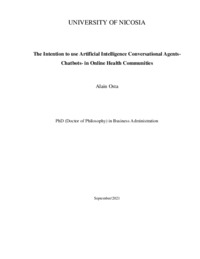- Osta, Alain
- School of Business
- Department of Management
- March 2022
- English
- 357 pages
- Kokkinaki, Angelika | Chedrawi, Charbel | Epaminonda, Epaminondas
- Online Health Communities | AI Conversational Agents | Chatbots | Healthbots | Artificial Intelligence | Sociomateriality | UTAUT Model | UTAUT Variables/Constructs | Behavioral Intention | Healthcare | Patient’s Experience
- Business Administration -- Management and MIS
-
-
We are witnessing a rise in online communities of patients, self-organizing, clinicians, caregivers, academics, and researchers as well as more Artificial Intelligence (AI) conversational agents in the form of chatbots in Online Health Communities (OHC). The literature lacks evidence on the acceptability of AI conversational agents (chatbots) and the motivations for their adoption in healthcare industry.
This study aims to propose a model that examines the intention of using AI health chatbots applications in OHCs from a sociomateriality perspective; in which materiality creates the social world and the social world additionally impacts the materiality part of technology. Comprehending how AI conversational agents/chatbots and users' intentions interact in OHCs can be improved by understanding the distinction between social and material agency through the concept of sociomateriality.
The contribution of this research was demonstrated on several levels, including; i) a systematic literature review of the concepts AI conversational agents/chatbots, OHCs, sociomateriality, and the Unified Theory of Acceptance and Use of Technology (UTAUT) model; ii) an investigation of users' intentions to use AI conversational agents in OHCs using the UTAUT model; iii) the selection of the sample of OHCs’ users on social media; and iv) testing and confirming the use of the UTAUT model's additional constructs and moderators.
Using a quantitative methodological approach, the UTAUT model was used to investigate OHCs users' behavior and intentions toward AI conversational agents/chatbots. A questionnaire was employed to collect data, and respondents are chosen using the cluster sampling approach. On a 7 Likert scale, respondents were asked to select which choice best suited their reaction to any ofthe topics presented. A total of 632 answers from 62 countries were received, with 443 of them being complete. The bivariate, multivariate analysis including Pearson correlation, student t-test, ANOVA, and Chi-Square tests were used to examine the data.
Findings showed the interrelations between AI conversational agents/chatbots and OHCs from a sociomateriality perspective on users’ Behavioral Intention (BI). The main constructs of the UTAUT model (Performance Expectancy, Effort Expectancy, Social Influence, and Facilitating Conditions) along with the two proposed UTAUT extensions (Fear of Technological Advancements and Trust) had a significant impact on the participants' Behavior Intention and Usage Behavior (UB) for AI conversational agents/chatbots in OHCs. Regarding moderators, the three common moderators (gender, age, and experience), as well as COVID-19, had no effect on BI and UB while the suggested moderators (educational levels, occupations, geographical zones, technological and chatbots experience) had a significant impact on the use of OHCs.
Theoretical contributions such as adding variables and moderators to UTAUT model were highly significant and the sociomaterial approach expanded the understanding of users’ intentions to use chatbots in OHCs. UTAUT extensions and the technique for reaching OHCs members were also examples of methodological contributions. Managerial contributions included suggestions to decision-makers, governments, the healthcare and business sectors on issues such as how they should prioritize the use of chatbots in OHCs to ensure a better patient experience. Moreover, four propositions related to the development of theoretical frameworks, the integration into daily use, and raising awareness of healthbots were produced. Finally, research and contextual limitations were addressed, including the UTAUT model's limitations and the generalization of results.
-
The Intention to use Artificial Intelligence Conversational Agents-Chatbots- in Online Health Communities
Main Files
 Full text
Full text
Description: FINAL SUBMISSION - THESIS -Alain Osta-15-3-22.pdf (pdf) Book Reader
Size: 2.3 MB
| Type | Location | Link |
|---|---|---|
| dissertation | [More information] |

